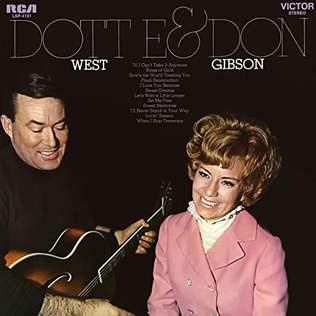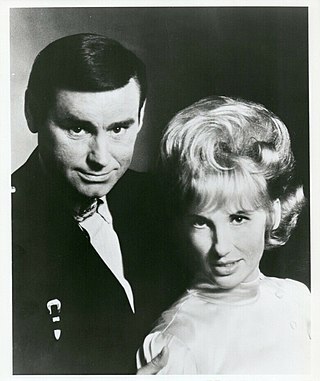Related Research Articles

Bobbie Gentry and Glen Campbell is a studio album by American singer-songwriters Bobbie Gentry and Glen Campbell. It was released on September 16, 1968, by Capitol Records.
"No Charge" is a country music song, written by songwriter Harlan Howard. It was first recorded by country singer Melba Montgomery, whose 1974 version was a #1 country hit in both the US and Canada, as well as making #39 on the US pop charts. In the UK, the song is associated with J. J. Barrie, whose 1976 version was a #1 UK hit.

Melba Joyce Montgomery is an American country music singer and songwriter. She is known for a series of duet recordings made with George Jones, Gene Pitney and Charlie Louvin. She is also a solo artist, having reached the top of the country charts in 1974 with the song, "No Charge". Born in Tennessee but raised in Alabama, Montgomery had a musical upbringing. Along with her two brothers, she placed in a talent contest which brought her to the attention of Roy Acuff. For several years she toured the country as part of his band until she signed with United Artists Records in 1963.
"It's Just a Matter of Time" is a Pop song written by Brook Benton, Clyde Otis, and Belford Hendricks. The original recording by Benton topped the Billboard Hot R&B Sides chart in 1959 and peaked at No. 3 on the Hot 100 pop chart, the first in a string of hits for Benton that ran through 1970.

Dottie and Don is a studio album by American country music artists Don Gibson and Dottie West. It was released in March 1969 on RCA Victor Records and was produced by Chet Atkins and Danny Davis. The album was a collection of duet recordings between Gibson and West. It was both artists first album of duets to be recorded. Among the songs from the project, "Rings of Gold" became a major hit in 1969.
"We Must Have Been Out Of Our Minds" is a song made famous as a duet by country music singers George Jones and Melba Montgomery. Originally released in 1963, the song became a Top 5 hit on the Billboard Hot Country Singles chart and a country music standard.
The discography of Buck Owens, an American country music artist, consists of 39 studio albums, 16 compilation albums, 9 live albums, 97 singles, and 12 B-sides. After recording under the name Corky Jones and releasing a string of singles in the mid-1950s, Owens signed a recording contract with Capitol Records in February 1957.
"Baby (You've Got What It Takes)" is a 1950s song written by Clyde Otis and Murray Stein.

The discography of American country artist, Melba Montgomery contains 29 studio albums, eight compilation albums, 61 singles, one other charting song and has appeared on five albums. Of her studio albums, 22 are solo releases while seven are collaborative releases. Of her singles, 42 are solo releases while 18 are collaborative. Montgomery collaborated with George Jones on 1963's "We Must Have Been Out of Our Minds", which reached number three on the Billboard Hot Country Songs chart. Together, they recorded several studio albums including What's in Our Heart (1963), which reached number three on the Billboard Top Country Albums chart. The United Artists and Musicor labels issued several more singles by the pair. Among them were the top 25 songs "Multiply the Heartaches" (1965) and "Party Pickin'" (1967). She also collaborated with Gene Pitney during the sixties on the top 20 single "Baby Ain't That Fine" (1965). Both United Artists and Musicor issued several solo studio albums and singles by Montgomery during the sixties also. Among them was the charting single "Hall of Shame" (1963) and the 1967 LP, Don't Keep Me Lonely Too Long (1967).

The discography of American country artists George Jones and Tammy Wynette contains the recordings they made as a vocal duo. Their discography includes nine studio albums, 14 compilation albums, 15 singles and one music video. In October 1971, the duo's first studio album was released by Epic Records and was titled We Go Together. It peaked at number three on the American Billboard Top Country Albums chart and number 169 on the Billboard 200 list. Included on the disc was the duo's first single, "Take Me". It reached the top ten on the American Billboard Hot Country Songs chart and the top 20 on the Canadian RPM Country Tracks chart. It was followed by their second studio album called Me and the First Lady, which charted at number six on the Billboard country list. Featured on the disc was their second top ten single, "The Ceremony".

"You Turn Me On, I'm a Radio" is a 1972 song written and originally recorded by Canadian singer songwriter Joni Mitchell. It was released on her fifth studio album entitled For the Roses and was issued as a single as well.
"Don't Let the Good Times Fool You" is a song written by Ronald Hellard and Gary S. Paxton. It was recorded and released as a single by American country artist Melba Montgomery in 1975.
"Let's Invite Them Over" is a song written by Onie Wheeler, which was recorded as a duet by American country artists George Jones and Melba Montgomery. The song was released as the pair's second single in 1963.
"What's in Our Heart" is a song written by George Jones and Johnny "Country" Mathis. It was recorded and released as a B-side duet by American country artists George Jones and Melba Montgomery. It was recorded at the Columbia Recording Studio, located in Nashville, Tennessee, United States on May 23, 1963. The recording date was the second session that took place between Jones and Montgomery. Other songs included on the session were "Let's Invite Them Over", "Suppose Tonight Would Be Our Last", and "I Let You Go". The recording session included The Nashville A-Team of musicians, whom appeared on other recordings by the pair. The session was produced by Pappy Daily. "What's in Our Heart" was issued as the B-side to the pair's 1963 single "Let's Invite Them Over". The song received radio airplay and reached the twentieth position on the Billboard Magazine Hot Country Singles list. It became the duo's third major hit single together.
"Baby Ain't That Fine" is a song written by Dallas Frazier that was recorded as a duet between American country artists Melba Montgomery and Gene Pitney. The song was also released as a single in 1965.

The singles discography of American country artist, George Jones, contains 182 singles. Of the total, 136 were released with Jones as the solo artist. In addition, 31 were issued with Jones being part of a collaboration. Thirdly, eight singles were issued with Jones being part of a featured act. Fourthly, seven released were promotional singles. Additionally, 14 songs that are not released as singles are included that made any major chart. Finally, 21 music videos which were first issued as singles are also listed. Jones had his first chart success in 1955 with several top ten Billboard Hot Country Songs singles: "Why Baby Why", "What Am I Worth" and "You Gotta Be My Baby". After several more top ten releases, "White Lightning" became his first to top the Billboard country chart. Along with "Who Shot Sam", both singles were also his first to make the Hot 100 charts.

The singles discography of American country music artist Lynn Anderson contains 72 singles, three promotional singles, one charting B-side, two music videos and nine other song appearances. She signed her first recording contract with Chart Records in 1966. The following year, her single "Ride, Ride, Ride" debuted on the Billboard Hot Country Singles chart. Also in 1967, her single "If I Kiss You " became her first major hit when it reached number five on the country singles chart. Anderson had a series of hits that reached the top ten and 20 during the 1960s including "Promises, Promises" (1969), "No Another Time" (1968), "Big Girls Don't Cry" (1968) and "That's a No No" (1969).

No Charge is a studio album by American country artist, Melba Montgomery. It was released in April 1974 via Elektra Records and was the nineteenth studio collection of Montgomery's career. The disc contained a total of 12 tracks which mixed in different styles of country music. Its title track topped the country charts in the United States and Canada in 1974. The album itself reached the top 20 of the American country LP's chart in 1974 and received positive reviews following its release.
"Wrap Your Love Around Me" is a song recorded by American country artist, Melba Montgomery. It was composed by Montgomery, along with Jack Solomon. It was the first single of Montgomery's released on Elektra Records and reached the top 40 of the American country songs chart in 1973. It was included on her 1973 eponymous studio album. It was met with positive reception from Billboard magazine in 1973.

Melba Montgomery is a self-titled studio album by American country artist, Melba Montgomery. It was released in October 1973 via Elektra Records and contained 12 tracks. The disc was Montgomery's first with the Elektra label and eighteenth album overall. Material on the album mixed both uptempo numbers with ballads. New selections along with cover songs were included. The album included two singles. The first single, "Wrap Your Love Around Me", reached the top 40 of the American country songs chart in 1973. The album received positive reception from Billboard magazine following its release.
References
- 1 2 3 "Melba Montgomery Discography". Praguefrank's Country Discographies. 13 November 2014. Retrieved 24 December 2014.
- 1 2 Whitburn, Joel (2004). The Billboard Book Of Top 40 Country Hits: 1944-2006, Second edition. Record Research.
- 1 2 "Search results for "Melba Montgomery" under Country Singles". RPM . Archived from the original on 17 December 2014. Retrieved 17 December 2014.